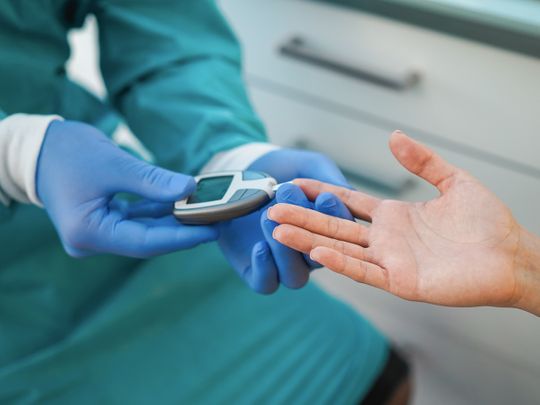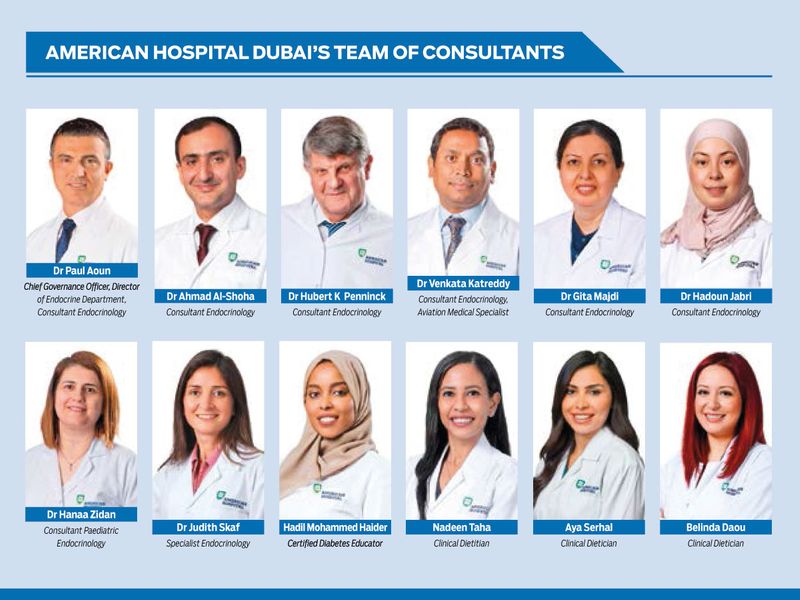
Highlight
The American Hospital Dubai is equipped to deliver the best primary and secondary care for those with diabetes and places special emphasis on patient education
The American Hospital Dubai’s Diabetes Center of Excellence is a multi-disciplinary outpatient department, devoted to providing a high quality of care for patients with endocrine and diabetes mellitus diseases. The clinic is equipped to deliver the best primary and secondary care and places special emphasis on patient education. Patients of all ages can be attended to, including newborn babies.
The Diabetes clinic is committed to achieving the mission and vision of the American Hospital Dubai, in line with the UAE law, standards, and regulations of the Dubai Health Authority, the Ministry of Health, Joint Commission International and established hospital and departmental policies and procedures. Furthermore, our endocrinology doctors in Dubai offer multiple methods of treatment and administration for every patient.
The Food and Nutrition Department at American Hospital Dubai provides comprehensive nutritional care, including food services, medical nutrition therapy, and outpatient consultation to all patients, staff, and visitors as needed. The purpose of this service is to provide nutritious and appealing meals. The menus are planned following the international guidelines of food and nutrition standards and specially adapted to suit the dietary habits of our multicultural patients, staff, and visitors.
As medicine continues to evolve, the field of endocrinology is no exception. The American Hospital Dubai (AHD) is at the forefront of acquiring cutting-edge developments in endocrinology.
“We are incorporating the latest technological advances (newer insulin pumps and CGM) approved so far in the UAE in the management of patients with diabetes,” says Dr Paul Aoun, Endocrinologist, American Hospital Dubai. “These devices help us better monitor blood glucose throughout the day and night, especially for those requiring insulin.”
The AHD Endocrinology Department is also one of the first in the region to use molecular/genetic markers to aid in the management of thyroid nodules. “We are looking forward to acquiring more technologies currently in the pipeline, awaiting approval,” says Dr Aoun.
On a different note, in June 2016 AHD became the first hospital in the region to join the Mayo Clinic Care Network. Mayo Clinic has been recognised as the best hospital in the US by US News and World Report. The inclusion reflects on a genuine trust in the quality of care that our team has been providing and gives AHD access to a wide range of current medical recommendations and trends in the US and worldwide.
“With these benefits available to every AHD physician — including endocrinologists — patients can get answers to complex medical questions at no additional cost to them — and without them needing to travel anywhere,” says Dr Aoun.

Different types of diabetes
Type 1 diabetes
Type 1 diabetes results in the loss of the insulin-producing cells of the pancreas, the beta (B)-cells. As a result, several organs fail to absorb the sugar leading to high glucose levels in the bloodstream. Though mostly diagnosed in children and young adults, it can occur at any age. Patients with type 1 may develop dehydration as the body secretes excess sugar through the urine. They may also experience weight loss, excessive thirst and urination, and other symptoms.
Risk factors
● Family history — Genetic factors play an important role in some people who develop Type 1 diabetes.
● Environmental factors — External factors like exposure to a vital illness or certain chemicals may trigger an immune system response and predispose someone to developing type 1 diabetes.
● Autoimmune – Those with a personal or family history of autoimmune conditions could be at risk for type 1 diabetes.
● Pancreatic injuries – A damage caused to the pancreas by an infection, tumor, surgery, or accident could also raise the risk of the disease.
Type 2 diabetes
Type 2 diabetes is the most common form of diabetes. In this condition, the body’s cells become resistant to insulin and as a result, sugar accumulates in the blood. In the advanced stages of the disease, the pancreas tries to produce more insulin to get the body to respond but fails to keep up. This can weaken the B-cells and patients could ultimately require insulin as part of their treatment regimen.
Risk factors
● Family history – the risk of getting type 2 diabetes increases if a close family member has it.
● Poor dietary habits and overweight – Bad dietary habits and accumulation of extra fat, especially in the abdomen, predispose the person to insulin resistance and type 2 diabetes.
● Physical inactivity – Lack of physical activity leads to weight gain and suboptimal utilisation of sugar for energy.
● Blood pressure and cholesterol – A blood pressure of 130/90 or higher, low high density cholesterol (HDL) levels, and high
triglycerides are associated with type 2 diabetes.
● Polycystic ovary syndrome – Women with polycystic ovary syndrome, characterised by irregular menstrual cycles, excess hair growth, acne, and/or obesity-are at higher risk for diabetes.
● Gestational diabetes – Women who have gestational diabetes (diabetes during pregnancy) have increased chances of getting type 2 diabetes later.
Gestational diabetes (GDM)
Blood sugar levels in some women increases during pregnancy leading to gestational diabetes. It is typically diagnosed between the 24th and 28th weeks of pregnancy. During pregnancy, hormones produced by the placenta make your cells more resistant to insulin. Responding to this, your pancreas makes extra insulin but sometimes cannot keep up. In such cases, too much glucose stays in your blood, resulting in gestational diabetes. Having gestational diabetes does not mean you had diabetes before your pregnancy, but it does raise the risk of developing type 2 diabetes in the future.
Risk factors
● Age - Women older than 25 years of age.
● Family or personal history of diabetes or prediabetes.
● Gestational diabetes with previous pregnancies.
● Overweight, obese, and/or excessive weight gain during pregnancy.

What’s on offer
American Hospital Dubai offers the following procedures
◆ Comprehensive diabetes care
◆ Insulin pump therapy
◆ Hormone disorders
◆ Thyroid gland care
◆ Lipid disorders
◆ Pituitary gland care
◆ Obesity
◆ Adrenal gland care
◆ Endocrine hypertension
◆ Endocrine tumors
◆ Calcium and mineral disorders
◆ Hirsutism
◆ Metabolic bone diseases
◆ Polycystic ovary syndrome
◆ Osteoporosis
◆ Male and female infertility
◆ Bone density measurement
◆ Sexual dysfunction
◆ Diabetes
◆ Lipid Clinic
◆ Weight Loss
◆ Gestational diabetes
— Call 800 24392 or visit ahdubai.com/services/diabetes-endocrinology-and-nutrition












